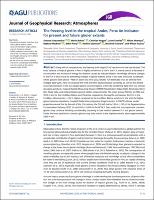The freezing level in the tropical Andes, Peru: An indicator for present and future glacier extents
Autor(es)
Fecha
2017-10Palabras clave
Ablation - Temperatura del Aire - Cambio Climático - CMIP - Freezing - Glacier mass balance - Glacier Retreat - Phase Transition - Snow - Spatiotemporal analysis - TRMM - AndesColecciones
- Artículo científico [177]
Resumen
Along with air temperatures, the freezing level height (FLH) has risen over the last decades. The mass balance of tropical glaciers in Peru is highly sensitive to a rise in the FLH, mainly due to a decrease in accumulation and increase of energy for ablation caused by reduced albedo. Knowledge of future changes in the FLH is thus crucial to estimating changes in glacier extents. Since in situ data are scarce at altitudes where glaciers exist (above ~4800 m above sea level (asl)), reliable FLH estimates must be derived from multiple data types. Here we assessed the FLHs and their spatiotemporal variability, as well as the related snow/rain transition in the two largest glacier-covered regions in Peru by combining data from two climate reanalysis products, Tropical Rainfall Measuring Mission (TRMM) Precipitation Radar Bright Band data, Micro Rain Radar data, and meteorological ground station measurements. The mean annual FLH lies at 4900 and 5010 m asl, for the Cordillera Blanca and Vilcanota, respectively. During the wet season, the FLH in the Cordillera Vilcanota lies ~150 m higher compared to the Cordillera Blanca, which is in line with the higher glacier terminus elevations. Coupled Model Intercomparison Project version 5 (CMIP5) climate model projections reveal that by the end of the 21st century, the FLH will rise by 230 m (±190 m) for Representative Concentration Pathway (RCP) 2.6 and 850 m (±390 m) for RCP8.5. Even under the most optimistic scenario, glaciers may continue shrinking considerably, assuming a close relation between FLH and glacier extents. Under the most pessimistic scenario, glaciers may only remain at the highest summits above approximately 5800 m asl. © 2017. American Geophysical Union.








